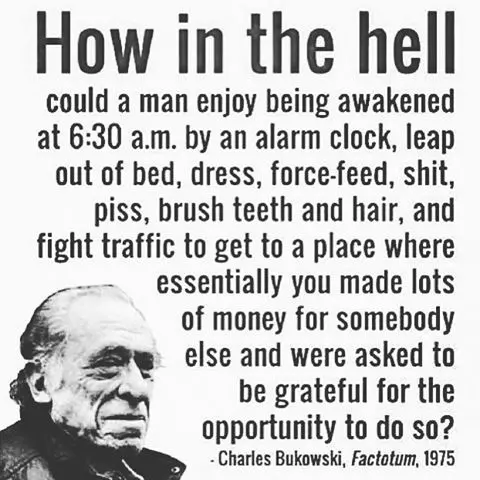this post was submitted on 29 Oct 2023
6 points (100.0% liked)
Work Reform
9830 readers
484 users here now
A place to discuss positive changes that can make work more equitable, and to vent about current practices. We are NOT against work; we just want the fruits of our labor to be recognized better.
Our Philosophies:
- All workers must be paid a living wage for their labor.
- Income inequality is the main cause of lower living standards.
- Workers must join together and fight back for what is rightfully theirs.
- We must not be divided and conquered. Workers gain the most when they focus on unifying issues.
Our Goals
- Higher wages for underpaid workers.
- Better worker representation, including but not limited to unions.
- Better and fewer working hours.
- Stimulating a massive wave of worker organizing in the United States and beyond.
- Organizing and supporting political causes and campaigns that put workers first.
founded 1 year ago
MODERATORS
you are viewing a single comment's thread
view the rest of the comments
view the rest of the comments

What is fair? How to define fair?
A common saying is that a fair deal is one that neither party feels happy with, because neither one is taking advantage of the other.
Which is what happens when a person is hired? Both parties are happy with the agreement, otherwise they wouldn’t accept, right?
Most people do not have the luxury of turning down a job offer, as the alternative is hunger and homelessness, which the employer uses as leverage to underpay their employee.
If housing and basic food staples were a human right (free) only then would you see fair wages in the open market, as people would have the option to turn down unfair jobs, forcing the employer to make them fair or hire no one.
Therefore, we come back to question: what is fair?
Well, for one; Wages keeping up with inflation and productivity would go a long way to being more fair.
But I'm curious why you're asking me what is fair, I already laid that out in my second paragraph in my previous comment. As I said, if the absolute basics to living were freely available, people would be free to reject unfair offers, and thus, in a theoretical 'free market' wages and benefits would increase to a truly fair and equal level.
So, your statement is that it is fair to guarantee the basic of living regardless of the person works or not. How do you respond to criticism that it is not fair to forcefully take money via taxes and spend them setting up standard of living for someone else?
It wouldn't be for someone else, it would be for everyone. Most people are okay with the idea of Universal Basic Income, because everyone gets it, even the rich, it's fair.
Imagine applying that universal concept, but to food and shelter. It would not only help the most destitute, but also the innovators. Research has shown that people are more willing to risk becoming entrepreneurs in Canada due to healthcare not being tied to employment. Imagine if we took away the risk of homelessness and malnutrition from not working for someone else? Hundreds of thousands would now be in a beautiful position to start their own business with far less risk to their, or their families, well being.
I would also place emphasis on the Basic part of Basic Necessities. It would only be feasible to provide just the most economical basics, which would mean a small square footage dwelling (think large apartment blocks, cheap to build, but efficient to heat and maintain), running water, electricity (with a kwh power-limit per month, anything over that would cost money), internet since it's a required utility in the modern age, and core/cheap but nutritious staple foods. We're not talking luxury apartments and food here.
(Personally, I would argue Universal Basic Income is not viable within our current system, as that extra money would be quickly siphoned out of everyone's pocket by increased rent and artificial price increases all around to capture this extra capital that would be floating around. It could only work if there were limits on rent and other basic necessities).
Being OK and being fair are different things. And I think significant amount of people, at least in US are against this, so, for them it would not be OK or fair. The reason I was bringing this up is to point on difficulty to define what fair is if it relies on things that are not fair to be implemented.
Based on your own thinking, what would you understand as the attributes of a relationship or agreement that may be considered fair?
I think the standard way of salary negotiations (labour supply and demand) is the only way to define fair salary. If this salary is not sufficient to make decent living, and if we want to correct for that, then it should be corrected by other means, such as UBI, out of compassion or other reasons, but not for fairness reasons.